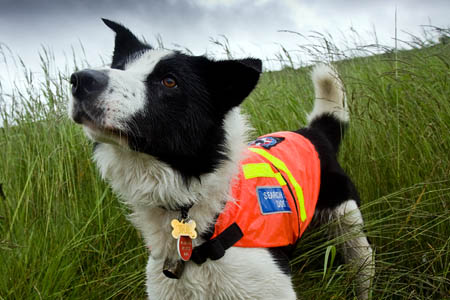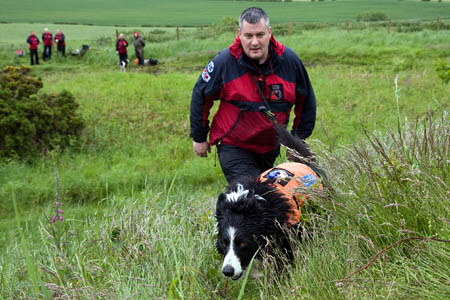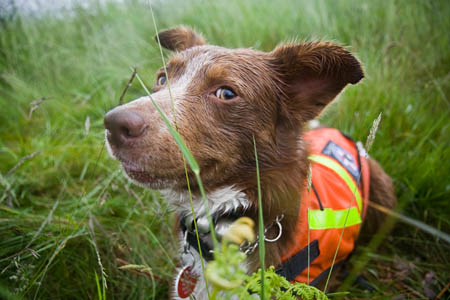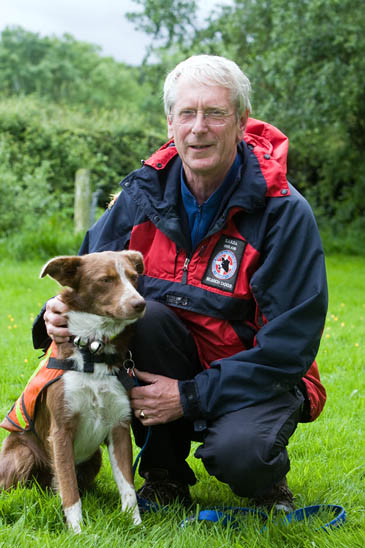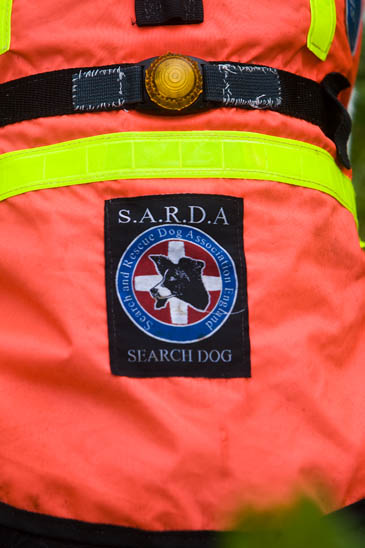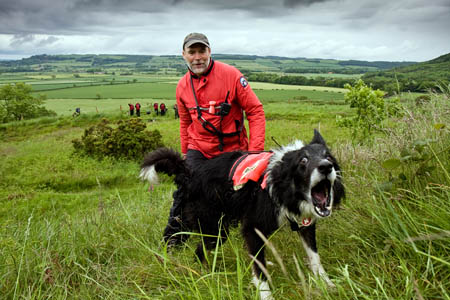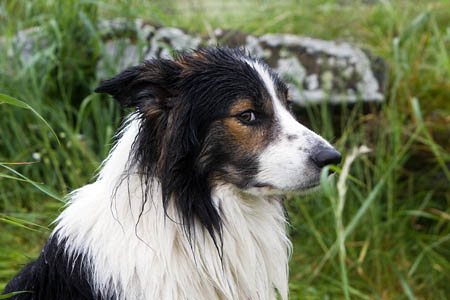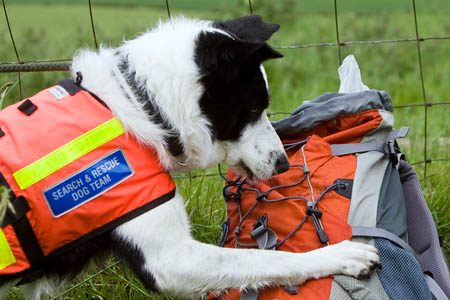It’s a sobering thought that the difference between life and death for a stricken hillwalker could be down to a squeaky toy.
A plaything for most people, the plastic toy is an essential tool for the corps of specialist mountain rescuers who are also dog handlers.
There are 35 qualified handlers in the Search and Rescue Dogs Association England, and the skills and senses of the teams of dogs and handlers can save a huge amount of time when searching for injured or lost walkers on the country’s mountains, hills and moorlands.
An early find by a Sarda dog could be crucial for a hypothermic or seriously injured hillgoer, and those squeaky toys play an important part in the process.
grough joined some of the teams at one of their regular training sessions, on the edge of the North York Moors national park to see at first hand how the dogs and handlers hone their search techniques.
Like all voluntary mountain rescue in the UK, Sarda members are unpaid and have to be prepared to drop everything when the callout comes. Sarda England covers the whole of England except the Lake District, which has its own association.
All its handlers – qualified and in training – must first be full members of a mountain rescue team, which means they trained in setting up rescues on steep and rocky ground, casualty care and navigation, though when they go on a team callout they will usually have a navigator with them to enable them to concentrate on operating the dog’s search.
The rising cost of fuel has placed a big burden on the Sarda England volunteers, who travel as far south as Dartmoor and as far north as the Lake District and Northumberland to take part in courses. It is mandatory to attend at least seven national training days each year, as well as local training.
It puts a big strain on the unpaid volunteers’ wallets and purses. Ian Thompson, chair of Sarda England, says the typical cost for each handler is £2,500 a year.
It was clear from talking to the handlers at the Carlton in Cleveland weekend that many are struggling to meet the costs.
As with all Britain’s mountain rescue, although the handlers are unpaid, the training and skill level is highly professional.
The 37 ‘graded’ handlers and dogs on the callout list have all passed a tough 2½-day assessment in the Lake District and as they progress will be expected to hone their expertise even further with an upgrade, showing speed and efficiency with their dog on the hill.
Mr Thompson explained the Sarda England training process that turns a puppy into a lifesaving member of a mountain rescue team. And it’s here that the essential squeaky toy comes into its own.
He said: “The first stage is obedience. We have a dog behaviourist, Jackie Hall, who comes along to a lot of our training sessions and she does basic obedience.
“At the end of that, the dog has to do an obedience test that will include walking to heel, on the lead and off the lead; lying down on command; coming on command.”
The dogs are then ‘stock-tested’ to make sure they will not chase sheep – essential as so many searches take place on hills where the animals are grazed. About 90 per cent of Sarda England dogs are border collies, so the natural instinct to go for the sheep has to be trained out of them.
Mr Thompson continued: “The next stage is basic finding and building up what we call a sequence.
“We get the dogs to respond to squeaky toys. One of the first things they have to do is to be able to bark on command. We then get our ‘bodies’ [the volunteers who act as simulated casualties] to take a squeaky toy, move just a few metres away and squeak the toy, to get the dog to come to the body, to bark and then get the reward of the toy.”
The distance is gradually increased until the body hides. “Very gradually, and this process can go on over months, the body gets further and further away, gets more difficult for the dog to find. The dog then doesn’t see where the body goes. It has to start searching, and it’s at that point the dog will use its sense of smell – use its scent receptors – to find the body.
“It’s getting that connection between scent, finding the body and getting the reward.
“The next stage is to get the dog to return to the handler, because when the dog is out there searching, it’s using its sense of smell, finds a casualty, it has to do the return sequence of coming back to the handler, and indicate to by barking to say ‘Look dad, look what I’ve found; I’ve got something here, woof, woof, woof’.”
The process continues to ensure the dog indicates by barking, and takes the handler to the casualty.
The Sarda chair said: “We’ve got to make sure that this is absolutely bomb-proof. If it’s not, it could happen on the hill.
“The dog could find somebody, come back to the handler and not indicate. That would mean they have missed the casualty and in a desperate situation that could be the difference between life and death.”
The areas worked gradually increase in size and the handler and dog will ‘clear’ an area – satisfying the search controller that there is no casualty in a particular part of the search area.
Mr Thompson said some dogs will range a quarter of a mile or more from their handler. “Once they are graded, the dog gets a little badge, and the handler also gets a badge that he can put on his jacket, and that means they can be used by mountain rescue teams,” he added.
“It’s a sort of quality assurance from Sarda that they can search and find.”
Sarda England dogs are air-scenting, but he said the organisation is just about to launch into trail-scenting training. “We see a necessity for that, particularly when it comes to urban searches. And we are having now to do a lot more urban searching,” Mr Thompson said.
“I think with the police forces under such financial pressure, they are calling on us more and more to do urban and semi-urban work and there is a necessity now to go into trailing dogs.
“Ian Nicholson from Bowland Pennine [Mountain Rescue Team] is going to work with us because we aren’t experts with trailing dogs, but he is.”
A trailing dog will be given a item or piece of clothing or be taken to a vehicle, get the scent of a particular person and follow it.
Ian Thompson, one of 23 handlers at the Cleveland weekend, is a member of the North of Tyne Mountain Rescue Team. He has been in mountain rescue 30 years and 13 years in Sarda.
Out on the slopes of Roseberry Topping, we watch as handlers and dogs search for the ‘dogsbodies’ who have hidden themselves on a steep slope.
The experienced handlers watch from below as teams work the hillside, clearing areas and – usually – finding the volunteers lying beneath gorse bushes, in bracken and heather and in gullies where they cannot be seen.
It’s difficult terrain, steep and covered in young bracken shoots. Every now and then, the hillside wind carries the sound of a border collie’s bark as the dog ‘indicates’ to the handler.
Then, I get the chance to be a body. Mercifully, I’m only a short distance from the handlers and, unlike some of the volunteer casualties who are out on the hill all day, I only have to lie there a short while. And the rain has stopped.
There’s a good wind blowing and each dog in succession successfully finds me, circumventing some nasty brambles that could injure their paws, and a variety of squeaky toys are tossed to the dogs as their reward for a successful find.
It’s easy to imagine what a welcome sign the dog, with its bright search dog coat and badges, must be to a stricken walker or outdoor enthusiast out on the hill.
One of the body’s duties when found is to throw the toy for the dog to retrieve, a game of which none of them seems to tire.
Higher on the hill, dogs are still racing through the bracken, barking and returning to their handlers. Radio checks with the bodies are regular to make sure they are still comfortable and the trainers communicate with the handlers to tell them when they have reached the limit of their search area.
As the earlier mist and rain clear, the handlers come down from the hill, and the bodies emerge from their hiding places on the slopes of Roseberry Topping. For some, a 300-mile journey lies ahead to get home.
Other handlers and bodies are a few miles away in a wood near Osmotherley and they too return to the Scout base that is their temporary home for the weekend before heading for their own territory.
The accommodation costs for the weekend have been met by a local outdoor activity provider, Zenith Leisure, a big saving for the volunteers who still have to provide their own food and drink and fuel their motors.
So why do these men and women devote so much time and money to Sarda England and their rescue teams? Brian Allport is one of the trainers on the course. Originally from Manchester he now lives in Northumberland and is a member of the Northumberland National Park Mountain Rescue Team.
He said: “It’s good to see the dogs doing something useful rather than just sitting at home as a pet.
“Initially I got involved in mountain rescue then I got involved with the dogs. I like dogs; I’ve always had dogs and to actually be able to use them and do something useful was the next step forward, combining a hobby and doing something useful.”
His dog Sam was one of the ones who came bounding through the bracken to find me.
But the continuing cost for the men and women who are on the training weekend is a real burden. Wayne Thackray, a member of the Woodhead Mountain Rescue Team south of Huddersfield, admits to reining in his rescue activities when cash gets tight.
It’s vital, he says, that Sarda England attracts more sponsorship to ease the cost to its volunteers, who are being called on more and more as police and public bodies’ budgets are squeezed as part of the Whitehall austerity programme.
“We are always on the lookout for new sponsors,” he said. “By sponsoring a course, you can do your bit without actually having to come out and get wet. Sponsorship of courses actually helps reduce our operating costs.
“The major cost is the accommodation funding of training.”
Last year, Sarda England’s dogs successfully found 16 casualties including the two crew of a light aircraft that crashed on Ingleborough in the Yorkshire Dales; a Duke of Edinburgh’s Award team lost in the Peak District; a man lost on the Pennines’ highest hill, Cross Fell, and two men lost on the notoriously difficult navigation prospect Bleaklow, the last rescue involving seven separate dogs and handlers.
All have cause to thank the unpaid volunteers and their four-legged friends who turn out in all weathers to look for walkers in distress.
grough readers who want more details of Sarda England, and to offer sponsorship, to donate to the organisation and to find out how to become a dogsbody, can visit the charity’s website.
